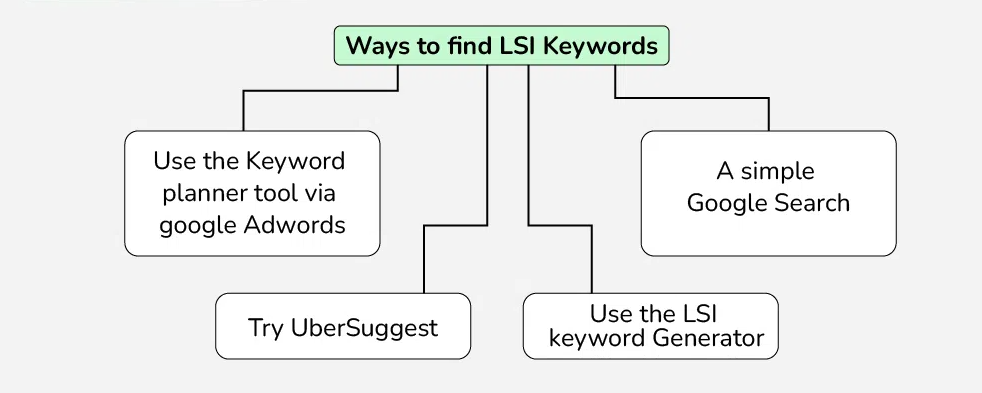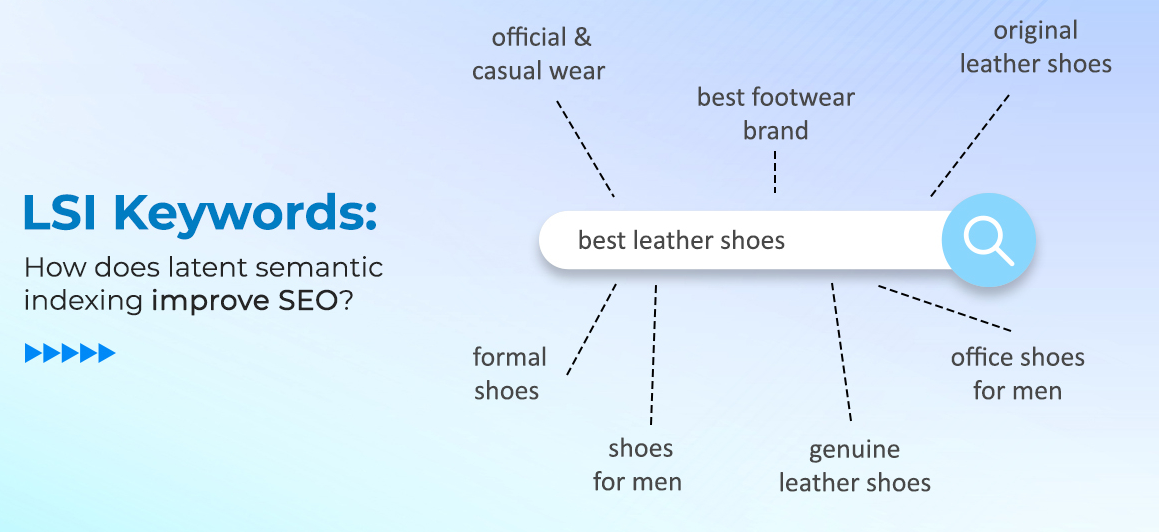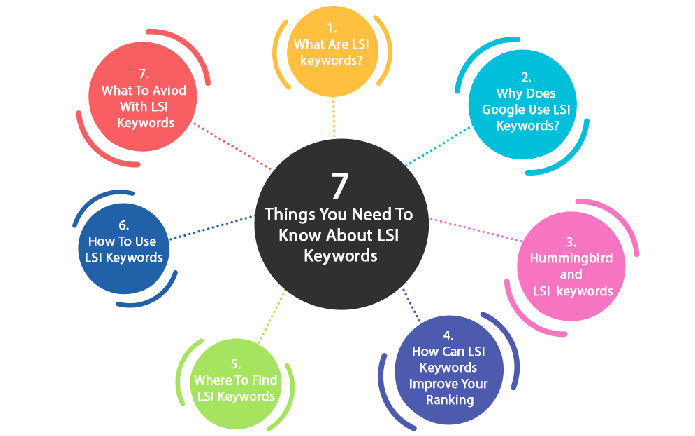
Book a Free Consultation Now
Would you like to know more about this topic?
Contact us on WhatsApp and get a free consultation from our experts
Contact on WhatsApp NowHow to use LSI keywords starts by identifying your main keyword, then finding related words and phrases from Google autocomplete, related searches, and top-ranking pages. These terms should be added naturally within your content, including subheadings, body text, meta descriptions, and image alt text, without overuse. The goal is to clarify context for search engines while keeping the content readable and valuable for users. For businesses that want accurate implementation without SEO mistakes, Nofal SEO provides professional LSI keyword optimization to improve relevance and search visibility.
How do search engines work?
Search engines crawl every page on your website, try to understand it, and index each page under its relevant categories, which is where LSI keywords come in. LSI keywords are just variations of your primary or target keyword.
Search engines work by matching user queries with the most relevant and high-quality content available online. They evaluate pages based on multiple signals such as content depth, semantic relevance, user intent, page structure, and overall authority. Understanding How to use LSI keywords helps search engines connect related concepts within a page, making it easier to determine whether the content fully answers the search query and deserves to appear in top results.
What are LSI keywords?
However, this is no longer the case. Google checks your webpage to see if you used LSI keywords, because these additional keywords or help words provide some additional information that just the keyword doesn’t convey. For example, let’s say you’re writing a blog post about Web Design.
In this case, Google will scan the content, title, meta description, URL and image alt text for LSI keywords such as “web design”, “web design companies”, “web design company” and “best web design”. This is so that you can better understand your content and this is how LSI keywords are used.
If you look closely, you’ll see that all of the LSI keyword helpers tell Google exactly what’s going on in your content. While “web design” could be your keyword, phrases like “best web design company” and “web design companies” add more context that enhances your content.
What is the importance of LSI words?
“LSI” keywords are important because they help search engines better understand and index your content. This means that your pages will have a greater chance of appearing in the search results for search queries related to the words you target and want to appear and lead in.
If you know what additional keywords Google wants to find for an article on a specific topic, you can use those keywords to add more value to your content. This will not only make your post more relevant, but also increase the likelihood that it will rank in the SERP for your target keyword.
Are all LSI words synonyms?
The simple answer to this question is no. The words can sometimes be synonymous but this is not always the case. The “LSI” keyword can be any term closely related to your main keyword. For example, the LSI keywords for the keyword “SEO” would be additional keywords SEO and SEO. They are not synonyms but general terms related to the primary keyword, which is SEO.
Next, we’ll learn how to find LSI keywords.

At Nofal SEO, our content strategies are built on a deep understanding of how search engines interpret meaning, which is why we rely on contextual keyword signals to connect related ideas within each page. By analyzing how keywords appear together naturally, we ensure that content communicates clear topic relevance to search engines while remaining valuable and readable for users.
How do you find the correct LSI words?
We’ll first look at the different ways you can find “LSI” keywords to include in your content and How to use LSI keywords.
Check related searches in Google
The easiest way to find LSI keywords for any post is to enter your keyword into the search bar. Next, scroll down to the Related Searches section. If you are writing about “face masks,” you may also want to include information regarding their price, texture, washability, etc.
For any search, related searches will tell you what to include in your content besides the keyword. In addition, you can also check out the “Also Ask” section to get a better idea of the search intent. We will complete the following methods for extracting auxiliary keywords, and what is the correct way to use LSI keywords?
Methods for extracting help keywords
Normally you will only get 7-8 “LSI” keywords for your content, if you want a more comprehensive keyword list in “LSI” then you should take a look at the other methods below.
LSIGraph
One quick way to get a list of LSI keywords is to use a free tool like LSIGraph. All you have to do is add your keyword in the search bar. Let’s try adding the keyword, “heels”.

When you click the “generate” button on the right, here are the results you get. The tool also displays search volume, trend, cost per click, and other details.

Please note that keywords are not added in a specific order. So, don’t assume that the items listed at the top should be used more or are more important than others.
Google Autocomplete
excerpts
The third way to find LSI keywords on Google is through the snippets you see in SERPs. Google highlights in bold some terms that match your keyword. For example, if you enter the keyword, “sunflower oil,” Google also highlights the phrase “sunflower seeds” in bold.
These two terms are closely related, so you might add sunflower seeds to your LSI keyword list for the keyword, “sunflower oil”. These are the LSI keywords that Google wants you to add to your content. You can easily find 7-8 keywords by checking different pages on SERP.
To achieve consistent ranking improvements, our optimization process focuses on improving how search engines evaluate page quality through accurate topic relevance scoring. This approach allows us to align every piece of content with the core subject it targets, ensuring stronger visibility for competitive search terms and higher trust signals over time.
google images tags
Another less obvious trick for finding LSI words for free is via Google Images. If you know how to use it well, it is actually a gold mine of LSI words. Here’s how you can use it. First, add your keyword in Google Images. For this example, let’s move on to the keyword, “off page”. As you can see in the screenshot below, Google displays related terms in the top panel. These are all LSI keywords that you can use to optimize your content.
How to use LSI keywords in your content
Once you’ve found suitable “LSI” words for your content, the next step is to add them. This leads us to the following questions:
- What is the way to use LSI keywords normally in the content?
- Where should you add LSI keywords in your content?
Now we’ll talk about how and where to add LSI keywords so that Google can find them easily, yet they don’t seem out of context or out of context. Our editorial frameworks are designed to strengthen authority by enhancing content semantic depth, allowing each topic to be covered from multiple meaningful angles. By expanding content with related concepts and supporting terms, we help search engines recognize expertise and reward pages with improved performance across a wider range of relevant queries.
How to use LSI words naturally in your writing
When you check the list of LSI keywords from the automatic keyword generator, you may realize that it is not easy to add them. Sometimes it may not make grammatical sense or it may be difficult to add in the flow of normal content. In such cases, what should you do? Here’s How to use LSI keywords naturally in your content:
- Break larger content sections into smaller sections and add your LSI keywords as subheadings.
- Add questions related to “LSI” keywords to start a new point.
- Add definitions for “LSI” keywords if they are relevant to your content.
Let us understand it with the help of an example. Let’s say the keyword for LSI is “automatic soap dispenser”. Here’s how to use it in different ways in your content:
- Statements: The biggest benefit of an automatic soap dispenser is that you can dispense soap in a touch-free manner.
- Questions: Do you want an automatic soap dispenser for your bathroom?
- Subheadings: How to make an automatic soap dispenser
Don’t these sentences sound natural? This way, you can manage to include LSI keywords and deliver value to the reader without disrupting the content.
Where should you add LSI keywords in your content?
- meta descriptions
- title tag
- Alt tags for the image
- H2 and H3 tags
- URL
- Main content
Google checks all of these places to understand the context of the article. That’s why you should add LSI keywords there. However, don’t try to stuff them just for the sake of adding them. Add them normally. Additionally, in your content, you should aim to include it in different sections organically. Typically, the ideal keyword density is 1.5%. However, for LSI keywords, there is no rule or discretion to add them. You can add them where it is normally possible.
How to Find LSI Keywords
Understanding How to use LSI keywords starts with knowing how to find them correctly. LSI keywords are discovered by analyzing search behavior and identifying terms that frequently appear alongside your main keyword. Search engines use these related terms to better understand the topic of your content and determine its relevance. Finding them helps you cover the topic more comprehensively and avoid relying on one keyword repeatedly.
A highly searched sub-keyword in this context is LSI keyword research tools, which help content creators uncover related phrases that align with real user search behavior and semantic relevance.
Steps to find LSI keywords:
-
Enter your main keyword in Google Search.
-
Review Google Autocomplete suggestions.
-
Scroll down to Related Searches at the bottom of the results.
-
Check People Also Ask questions.
-
Look for bolded words in search snippets.
-
Use tools like Google Keyword Planner or keyword research tools to discover related phrases.
-
Analyze top-ranking competitor pages and note recurring terms.
Effective SEO goes beyond keywords, which is why our strategies are driven by precise search intent alignment at every stage of content creation. We analyze user behavior and query intent to ensure that each page answers real user needs, leading to higher engagement, better dwell time, and improved conversion rates.
Does Google Use LSI in Their Algorithm?
Many SEO professionals misunderstand How to use LSI keywords, assuming Google relies on Latent Semantic Indexing as part of its ranking algorithm. In reality, Google uses advanced natural language processing systems to analyze meaning, intent, and context rather than relying on traditional LSI models.
A relevant sub-keyword here is Google semantic search, which reflects how Google evaluates pages holistically by understanding relationships between words instead of checking for predefined keyword sets.
What Google actually does instead:
-
Analyzes the overall topic of a page.
-
Evaluates semantic relationships between words.
-
Uses natural language processing (NLP).
-
Considers user intent, content quality, and relevance.
-
Reviews contextual signals beyond keyword repetition.
Even though Google doesn’t technically use LSI, adding related terms still helps clarify topic relevance.
What Are LSI Keywords Examples?
Learning How to use LSI keywords becomes easier when you review clear, practical examples. LSI keywords are not limited to synonyms; they include related terms that naturally appear when a topic is explained thoroughly and accurately.
A commonly searched sub-keyword is LSI keyword examples, which helps users understand how contextual terms strengthen content relevance without keyword stuffing.
Examples:
-
Main keyword: SEO
LSI keywords: search engine optimization, website ranking, organic traffic, Google algorithm -
Main keyword: Web Design
LSI keywords: responsive design, UX/UI, website layout, mobile-friendly -
Main keyword: Cold Brew Coffee
LSI keywords: grind size, cold water, brewing time, coffee filter
These terms help search engines understand the context of your content.
Maintaining a natural and engaging writing style is essential, and our team prioritizes natural keyword integration to balance optimization with readability. This method ensures that SEO efforts support the content rather than disrupt it, resulting in pages that perform well in search results while delivering a seamless experience for users.

How to Add LSI Keywords?
Knowing How to use LSI keywords properly means integrating them naturally into your content rather than forcing them into every paragraph. LSI keywords should support your main topic, improve clarity, and enhance the overall structure of your page.
An important sub-keyword in this area is on-page SEO optimization, and this is where Nofal SEO helps businesses implement semantic keywords strategically to improve rankings while maintaining a smooth user experience.
Steps to add LSI keywords correctly:
-
Identify 5–10 relevant LSI keywords.
-
Add them naturally within the main content.
-
Use them in subheadings (H2 or H3) where relevant.
-
Include them in the introduction or conclusion if they fit naturally.
-
Add them to image alt text when appropriate.
-
Use them in the meta description and title if they make sense contextually.
Why Do We Use LSI Keywords?
To fully understand How to use LSI keywords, it’s important to recognize their role in modern SEO. LSI keywords help search engines interpret content context, reduce ambiguity, and assess topical relevance more accurately.
A frequently used sub-keyword is SEO content relevance, which plays a key role in aligning content with search intent and improving visibility across related queries.
Key benefits:
-
Help search engines understand page context.
-
Improve rankings for related search terms.
-
Reduce over-optimization and keyword stuffing.
-
Improve content depth and quality.
-
Match user search intent more accurately.
Using LSI keywords supports modern semantic SEO strategies.
How Can I Use Keywords?
Mastering How to use LSI keywords also requires understanding general keyword usage principles. Keywords should be placed strategically across key elements of a page while maintaining natural readability and relevance.
A strong supporting sub-keyword here is keyword placement best practices, which ensures your content remains optimized without triggering over-optimization or harming user experience.
Best practices for using keywords:
-
Choose one primary keyword per page.
-
Place the main keyword in the title, URL, and first paragraph.
-
Support it with related and LSI keywords throughout the content.
-
Use keywords naturally in headings and body text.
-
Avoid keyword stuffing.
-
Focus on answering user intent clearly and completely.
Do you need a consultation about this topic?
Contact on WhatsApp

